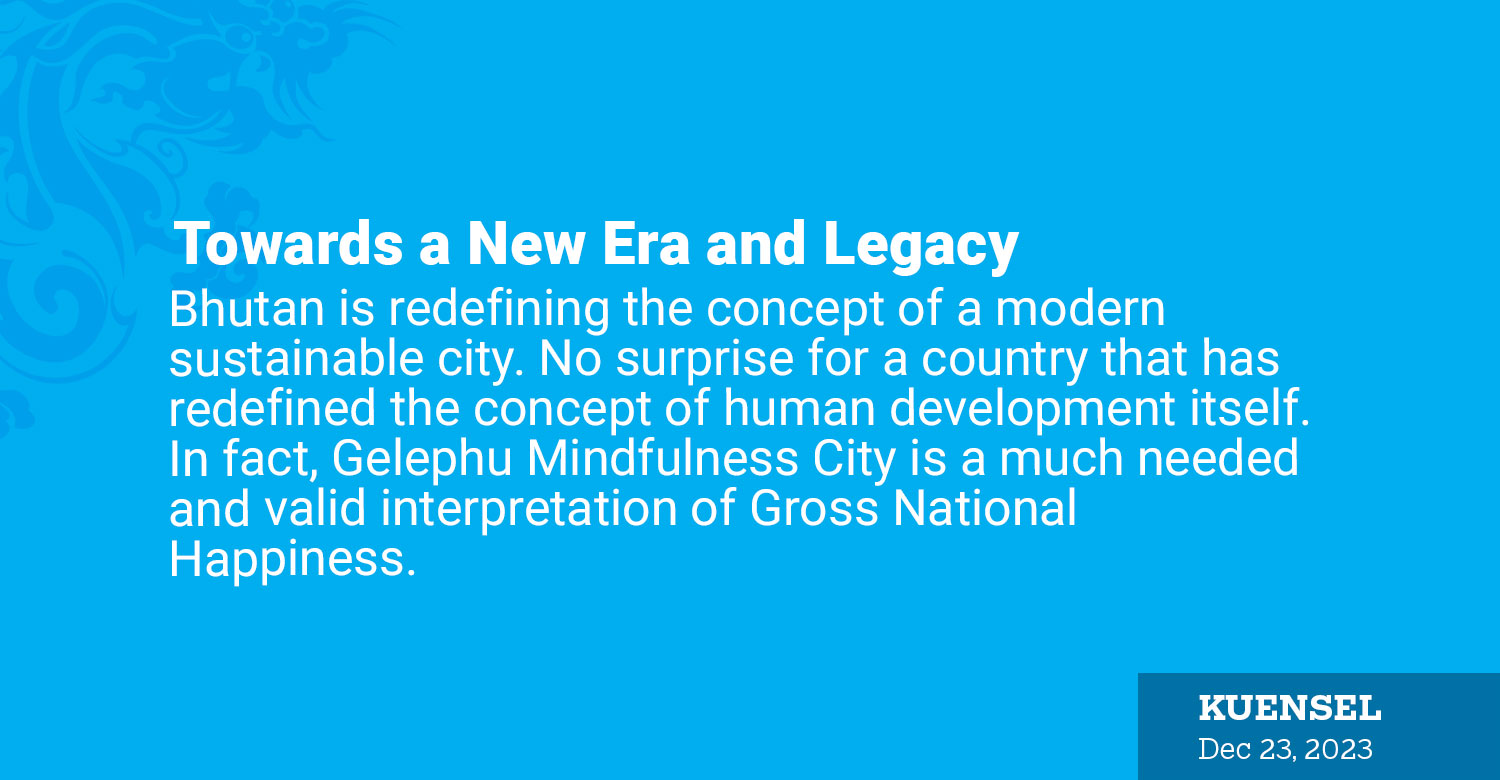Bhutan is redefining the concept of a modern sustainable city. No surprise for a country that has redefined the concept of human development itself. In fact, Gelephu Mindfulness City is a much needed and valid interpretation of Gross National Happiness. Many people misunderstand GNH merely as an alternative to materialism, gaining traction as a timely and, somewhat cosmic, concept.
National Day 2023 was the starting point of an initiative which becomes a turning point in Bhutan’s current situation. His Majesty The King declared the auspicious launch of the Gelephu Special Administrative Region which is designed to swing a not-so-healthy status quo into a robust economic acceleration of a new era.
Gelephu Mindfulness City, as a special administrative region, is not a city nor an administrative region as such constructs are conventionally known.
For many people today, a city is characterised by densely clustered high-rises – in essence a concrete jungle no matter how chic the architecture. We already see fake news painting Gelephu as such a city with false claims of ownership even quoted in well-known publications like Forbes. Fortunately, Gelephu represents a total contrast, but this obviously needs to be better known and understood.
A special administrative region would normally be understood as a demarcated area within a country with separate management, or with separate financial laws and regulations giving it the flexibility and incentives to be, for example, an economic hub.
Gelephu is unique because it is “Bhutanese” in identity, a blend of human life with natural ecology. Modern farms merge with natural flora and fauna, high tech transportation systems overlap with mechanised roads which criss-cross snow-fed rivers, traditional architecture frames modern living spaces, and electric cars run side by side with wild tigers and elephants.
A Bhutanese city will showcase a just and harmonious co-existence among different nationalities of people and different sections of society. It means synergy between people and wildlife. And it means the interdependence of all sentient beings, meaning all forms of life.
Drawing from the spirit of Vajrayana teachings, the Gelephu society will not push religion but personify spirituality. A Bhutanese Vajrayana master quotes the example of the cup and the tea – the tea being spirituality and the cup being the culture of religion. In a culture where humanity is engrossed in the cup, the tea is forgotten. Thus the emphasis on Vajrayana as spiritual teachings rather than as a religion.
In the context of Bhutanese history, Gelephu is a major stride in the transformation process. We are not only seeing the transition of society, which really means a passage of generations. We are experiencing transformation – people shaping their lives, building a nation.
It is a colossal leap. Even as some of us are yet to come to terms with our capital of 26 square kilometres, we are trying to wrap our minds around a space of more than 1,000 square kilometres. And it will be inhabited by a society existing in a balance of an extraordinary past and a future yet to unfold.
Are we talking about a new Bhutan in the making? No, the feel of a new Bhutan is already here. For example, the December 17 evening concert which symbolised the elevation of Bhutanese creativity. We saw the potential of Bhutanese artists at their best. What we need to do now is to tap the emotive energy into rewarding careers in the musical industry – songs and dances, light and sound technology, and the poetry of the Bhutanese languages.
Sometimes we are not conscious of even our immediate environment changing in front of us. Not long ago, we bought our vegetables from the open air sabji bazaar (vegetable market), using tattered notes. Now we shop at a sophisticated kaja throm (re-designed vegetable market) where vendors prefer digital transactions with mBob or mPay. When we visit the Desuup skilling workshops, we see the patang (knife) we used to chop bones is now so well tempered that it slices sheets of paper.
The essence of change is the expansion of the mind. We are talking about becoming a developed country. We have to aim beyond the comfort zone of subsistence farming to niche agriculture products, from budget travel to high end tourism. Gelephu Mindfulness City means an upscaling of lifestyle and values, not just profiting from a few decimals of land.
To embrace the new momentum and scenario, we need to shed old mindsets and set our sights on the larger picture. We are inspiring a revolution of ideas beyond a city, country, or continent. We are looking at changing, or at least influencing, the values of human existence.
As we listen to His Majesty The King who speaks to Bhutanese people around the world, with a focus on youth, we learn that the Royal vision was crafted with insightful observations, in-depth research, and consultations with leading global thinkers and doers. The vision is not just long term, it traverses the centuries.
International anticipation now is that South Asia is on the verge of economic transformation. It is at such a moment in history that His Majesty Jigme Khesar Namgyel Wangchuck, the fifth Monarch of the Wangchuck dynasty, declared the most significant Royal initiative of his reign. His Majesty will personally lead a team of Bhutanese and international experts to define his reign as a new era of Bhutan’s history as a legacy for future generations.
Contributed by
Dasho Kinley Dorji


